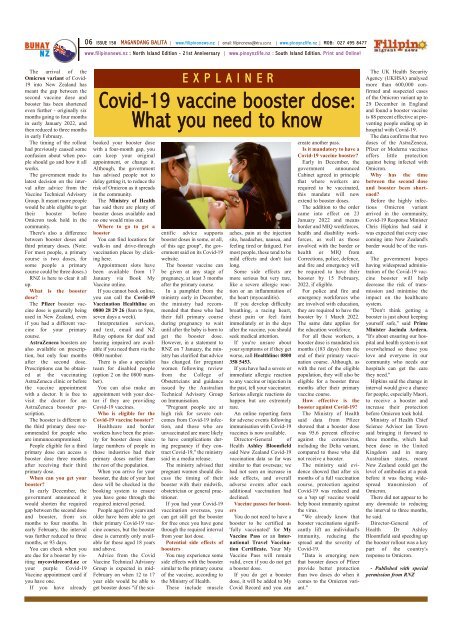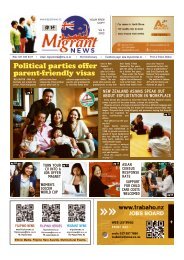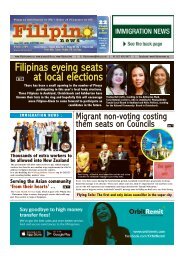Create successful ePaper yourself
Turn your PDF publications into a flip-book with our unique Google optimized e-Paper software.
BUHAY<br />
NZ<br />
06 ISSUE <strong>158</strong> MAGANDANG BALITA | www.filipinonews.nz | email: filipinonews@xtra.co.nz | www.pinoynzlife.nz | MOB: 027 495 8477<br />
www.filipinonews.nz : North Island Edition - 21st Anniversary | www.pinoynzlife.nz : South Island Edition. Print and Online!<br />
The arrival of the<br />
Omicron variant of Covid-<br />
19 into New Zealand has<br />
meant the gap between the<br />
second vaccine dose and<br />
booster has been shortened<br />
even further - originally six<br />
months going to four months<br />
in early January 2022, and<br />
then reduced to three months<br />
in early February.<br />
The timing of the rollout<br />
had previously caused some<br />
confusion about when people<br />
should go and how it all<br />
works.<br />
The government made its<br />
latest decision on the interval<br />
after advice from the<br />
Vaccine Technical Advisory<br />
Group. It meant more people<br />
would be able eligible to get<br />
their booster before<br />
Omicron took hold in the<br />
community.<br />
There's also a difference<br />
between booster doses and<br />
third primary doses. (Note:<br />
For most people, a primary<br />
course is two doses, for<br />
some people a primary<br />
course could be three doses.)<br />
RNZ is here to clear it all<br />
up.<br />
What is the booster<br />
dose?<br />
The Pfizer booster vaccine<br />
dose is generally being<br />
used in New Zealand, even<br />
if you had a different vaccine<br />
for your primary<br />
course.<br />
AstraZeneca boosters are<br />
also available on prescription,<br />
but only four months<br />
after the second dose.<br />
Prescriptions can be obtained<br />
at the vaccinating<br />
AstraZeneca clinic or before<br />
the vaccine appointment<br />
with a doctor. It is free to<br />
visit the doctor for an<br />
AstraZeneca booster prescription.<br />
The booster is different to<br />
the third primary dose recommended<br />
for people who<br />
are immunocompromised.<br />
People eligible for a third<br />
primary dose can access a<br />
booster dose three months<br />
after receiving their third<br />
primary dose.<br />
When can you get your<br />
booster?<br />
In early December, the<br />
government announced it<br />
would shorten the required<br />
gap between the second dose<br />
and booster, from six<br />
months to four months. In<br />
early February, the interval<br />
was further reduced to three<br />
months, or 93 days.<br />
You can check when you<br />
are due for a booster by visiting<br />
mycovidrecord.nz or<br />
your purple Covid-19<br />
Vaccine appointment card if<br />
you have one.<br />
If you have already<br />
E X P L A I N E R<br />
Covid-19 vaccine booster dose:<br />
What you need to know<br />
booked your booster dose<br />
with a four-month gap, you<br />
can keep your original<br />
appointment, or change it.<br />
Although, the government<br />
has advised people not to<br />
delay getting it, to reduce the<br />
risk of Omicron as it spreads<br />
in the community.<br />
The Ministry of Health<br />
has said there are plenty of<br />
booster doses available and<br />
no one would miss out.<br />
Where to go to get a<br />
booster<br />
You can find locations for<br />
walk-in and drive-through<br />
vaccination places by clicking<br />
here.<br />
Appointment slots have<br />
been available from 17<br />
January via Book My<br />
Vaccine <strong>online</strong>.<br />
If you cannot book <strong>online</strong>,<br />
you can call the Covid-19<br />
Vaccination Healthline on<br />
0800 28 29 26 (8am to 8pm,<br />
seven days a week).<br />
Interpretation services,<br />
and text, email and NZ<br />
Relay options for deaf and<br />
hearing impaired are available<br />
if you need them via the<br />
0800 number.<br />
There is also a specialist<br />
team for disabled people<br />
(option 2 on the 0800 number).<br />
You can also make an<br />
appointment with your doctor<br />
if they are providing<br />
Covid-19 vaccines.<br />
Who is eligible for the<br />
Covid-19 vaccine booster?<br />
Healthcare and border<br />
workers have been the priority<br />
for booster doses since<br />
large numbers of people in<br />
those industries had their<br />
primary doses earlier than<br />
the rest of the population.<br />
When you arrive for your<br />
booster, the date of your last<br />
dose will be checked in the<br />
booking system to ensure<br />
you have gone through the<br />
required interval period.<br />
People aged five years and<br />
older have been able to get<br />
their primary Covid-19 vaccine<br />
courses, but the booster<br />
dose is currently only available<br />
for those aged 18 years<br />
and above.<br />
Advice from the Covid<br />
Vaccine Technical Advisory<br />
Group is expected in mid-<br />
February on when 12 to 17<br />
year olds would be able to<br />
get booster doses "if the scientific<br />
advice supports<br />
booster doses in some, or all,<br />
of this age group", the government<br />
said on its Covid-19<br />
website.<br />
The booster vaccine can<br />
be given at any stage of<br />
pregnancy, at least 3 months<br />
after the primary course.<br />
In a pamphlet from the<br />
ministry early in December,<br />
the ministry had recommended<br />
that those who had<br />
their full primary course<br />
during pregnancy to wait<br />
until after the baby is born to<br />
get the booster dose.<br />
However, in a statement to<br />
RNZ on 7 January, the ministry<br />
has clarified that advice<br />
has changed for pregnant<br />
women following review<br />
from the College of<br />
Obstetricians and guidance<br />
issued by the Australian<br />
Technical Advisory Group<br />
on Immunisation.<br />
"Pregnant people are at<br />
high risk for severe outcomes<br />
from Covid-19 infection,<br />
and those who are<br />
unvaccinated are more likely<br />
to have complications during<br />
pregnancy if they contract<br />
Covid-19," the ministry<br />
said in a media release.<br />
The ministry advised that<br />
pregnant women should discuss<br />
the timing of their<br />
booster with their midwife,<br />
obstetrician or general practitioner.<br />
If you had your Covid-19<br />
vaccination overseas, you<br />
can get still get the booster<br />
for free once you have gone<br />
through the required interval<br />
from your last dose.<br />
Potential side effects of<br />
boosters<br />
You may experience some<br />
side effects with the booster<br />
similar to the primary course<br />
of the vaccine, according to<br />
the Ministry of Health.<br />
These include muscle<br />
aches, pain at the injection<br />
site, headaches, nausea, and<br />
feeling tired or fatigued. For<br />
most people, these tend to be<br />
mild effects and don't last<br />
long.<br />
Some side effects are<br />
more serious but very rare,<br />
like a severe allergic reaction<br />
or an inflammation of<br />
the heart (myocarditis).<br />
If you develop difficulty<br />
breathing, a racing heart,<br />
chest pain or feel faint<br />
immediately or in the days<br />
after the vaccine, you should<br />
seek medical attention.<br />
If you're unsure about<br />
your symptoms or if they get<br />
worse, call Healthline: 0800<br />
358 5453.<br />
If you have had a severe or<br />
immediate allergic reaction<br />
to any vaccine or injection in<br />
the past, tell your vaccinator.<br />
Serious allergic reactions do<br />
happen but are extremely<br />
rare.<br />
An <strong>online</strong> reporting form<br />
for adverse events following<br />
immunisation with Covid-19<br />
vaccines is now available.<br />
Director-General of<br />
Health Ashley Bloomfield<br />
said New Zealand Covid-19<br />
vaccination data so far was<br />
similar to that overseas; we<br />
had not seen an increase in<br />
side effects, and overall<br />
adverse events after each<br />
additional vaccination had<br />
declined.<br />
Vaccine passes for boosters<br />
You do not need to have a<br />
booster to be certified as<br />
'fully vaccinated' for My<br />
Vaccine Pass or an International<br />
Travel Vaccination<br />
Certificate. Your My<br />
Vaccine Pass will remain<br />
valid, even if you do not get<br />
a booster dose.<br />
If you do get a booster<br />
dose, it will be added to My<br />
Covid Record and you can<br />
create another pass.<br />
Is it mandatory to have a<br />
Covid-19 vaccine booster?<br />
Early in December, the<br />
government announced<br />
Cabinet agreed in principle<br />
that where workers are<br />
required to be vaccinated,<br />
this mandate will now<br />
extend to booster doses.<br />
The addition to the order<br />
came into effect on 23<br />
January 2022 and means<br />
border and MIQ workforces,<br />
health and disability workforces,<br />
as well as those<br />
involved with the border or<br />
health or MIQ from<br />
Corrections, police, defence,<br />
and fire and emergency will<br />
be required to have their<br />
booster by 15 February,<br />
2022, if eligible.<br />
For police and fire and<br />
emergency workforces who<br />
are involved with education,<br />
they are required to have the<br />
booster by 1 March 2022.<br />
The same date applies for<br />
the education workforce.<br />
For all these workers, a<br />
booster dose is mandated six<br />
months (183 days) from the<br />
end of their primary vaccination<br />
course. Although, as<br />
with the rest of the eligible<br />
population, they will also be<br />
eligible for a booster three<br />
months after their primary<br />
vaccine course.<br />
How effective is the<br />
booster against Covid-19?<br />
The Ministry of Health<br />
said data from Pfizer<br />
showed that a booster dose<br />
was 95.6 percent effective<br />
against the coronavirus,<br />
including the Delta variant,<br />
compared to those who did<br />
not receive a booster.<br />
The ministry said evidence<br />
showed that after six<br />
months of a full vaccination<br />
course, protection against<br />
Covid-19 was reduced and<br />
so a 'top up' vaccine would<br />
help boost immunity against<br />
the virus.<br />
"We already know that<br />
booster vaccinations significantly<br />
lift an individual's<br />
immunity, reducing the<br />
spread and the severity of<br />
Covid-19.<br />
"Data is emerging now<br />
that booster doses of Pfizer<br />
provide better protection<br />
than two doses do when it<br />
comes to the Omicron variant."<br />
The UK Health Security<br />
Agency (UKHSA) analysed<br />
more than 600,000 confirmed<br />
and suspected cases<br />
of the Omicron variant up to<br />
29 December in England<br />
and found a booster vaccine<br />
is 88 percent effective at preventing<br />
people ending up in<br />
hospital with Covid-19.<br />
The data confirms that two<br />
doses of the AstraZeneca,<br />
Pfizer or Moderna vaccines<br />
offers little protection<br />
against being infected with<br />
Omicron.<br />
Why has the time<br />
between the second dose<br />
and booster been shortened?<br />
Before the highly infectious<br />
Omicron variant<br />
arrived in the community,<br />
Covid-19 Response Minister<br />
Chris Hipkins had said it<br />
was expected that every case<br />
coming into New Zealand's<br />
border would be of the variant.<br />
The government hopes<br />
having widespread administration<br />
of the Covid-19 vaccine<br />
booster will help<br />
decrease the risk of transmission<br />
and minimise the<br />
impact on the healthcare<br />
system.<br />
"Don't think getting a<br />
booster is just about keeping<br />
yourself safe," said Prime<br />
Minister Jacinda Ardern.<br />
"It's about ensuring our hospital<br />
and health system is not<br />
overwhelmed so those you<br />
love and everyone in our<br />
community who needs our<br />
hospitals can get the care<br />
they need."<br />
Hipkins said the change in<br />
interval would give a chance<br />
for people, especially Maori,<br />
to receive a booster and<br />
increase their protection<br />
before Omicron took hold.<br />
Ministry of Health Chief<br />
Science Advisor Ian Town<br />
said bringing it forward to<br />
three months, which had<br />
been done in the United<br />
Kingdom and in many<br />
Australian states, meant<br />
New Zealand could get the<br />
level of antibodies at a peak<br />
before it was facing widespread<br />
transmission of<br />
Omicron.<br />
There did not appear to be<br />
any downside to reducing<br />
the interval to three months,<br />
he said.<br />
Director-General of<br />
Health Dr Ashley<br />
Bloomfield said speeding up<br />
the booster rollout was a key<br />
part of the country's<br />
response to Omicron.<br />
- Published with special<br />
permission from RNZ

















